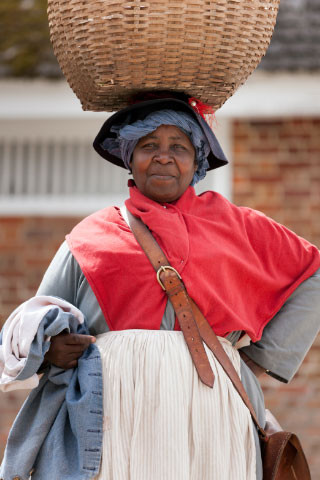Edith Cumbo circa 1735 — ?

During the American Revolution, free black women like Edith Cumbo had to choose between supporting the Americans or the British. Like many free blacks, Edith had a vested interest in protecting her status, family, relatives, and livelihood. If she supported the British, she risked losing everything she had accomplished. Supporting the Americans, though, denied her full and equal rights of free white citizens. Virginia law, for example, required that Edith pay taxes, yet it also prohibited her from voting or testifying in court against a white person.
Edith Cumbo was the head of her own household in Williamsburg, Virginia (North America) in the late 1770s and one of only a handful of free blacks living within the city limits about the time of the American Revolution. Cumbo was likely born in Charles City County, Virginia, several miles from Williamsburg. She was the daughter of Richard and Fortune Cumbo. Edith was not enslaved because her mother was a free woman when Edith was born. According to eighteenth-century Virginia law, a child born in the colony inherited the free or enslaved status of his or her mother. She grew up with her five brothers: Richard, Michael, Peter, Stephen, and Thomas.
From Charles City County, Edith Cumbo moved to Halifax County, where her son, Daniel Cumbo, was born, perhaps in the mid-1750s. In August 1769, the churchwardens of Antrim Parish in Halifax County presented Edith to the Halifax County Court for having a child out of wedlock. The justices found Edith not guilty based on evidence presented to them at the trial. By the late 1770s, Cumbo lived in Williamsburg proper, and her parents and siblings lived nearby.
Navigating an eighteenth-century British slave society as a free woman, Edith Cumbo was independent and resourceful. She was unmarried, likely earning a living as a domestic servant, laundress, or seamstress. In June 1778, Edith Cumbo took steps to protect her property and household when she sued Adam White in court for trespass, assault and battery.
Cumbo probably attended the parish church wherever she lived, perhaps including Bruton Parish Church in Williamsburg, at least once a month according to law. She likely could read the Bible and the Book of Common Prayer. She may have also been familiar with Baptist preachers such as Moses and also Gowan Pamphlet who preached an evangelical message.
Women like Edith Cumbo were a part of a vibrant free black community in Williamsburg and throughout the North American colonies and United States. They helped to build the foundation of African American institutions after the American Revolution. They operated businesses, established churches, mutual aid societies, and other organizations to support their communities’ efforts to fight for freedom and equality in the United States.







